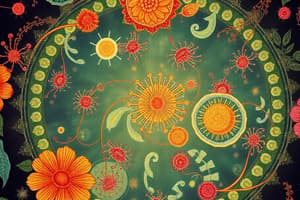Podcast
Questions and Answers
What is one of the basic biological molecules that provides energy for cells?
What is one of the basic biological molecules that provides energy for cells?
- Proteins
- Lipids
- Nucleic Acids
- Carbohydrates (correct)
Which level of biological organization includes a community of living organisms and their non-living environment?
Which level of biological organization includes a community of living organisms and their non-living environment?
- Biosphere
- Population
- Community
- Ecosystem (correct)
What is the primary purpose of the scientific method in biology?
What is the primary purpose of the scientific method in biology?
- To systematically investigate natural phenomena (correct)
- To develop new hypotheses
- To gather specimens for research
- To classify organisms
Which type of reproduction involves two parents?
Which type of reproduction involves two parents?
Which type of cell is characterized by the absence of a nucleus?
Which type of cell is characterized by the absence of a nucleus?
What is the central dogma of molecular biology?
What is the central dogma of molecular biology?
Which of the following statements is true regarding cell theory?
Which of the following statements is true regarding cell theory?
What role does natural selection play in evolution?
What role does natural selection play in evolution?
What is metabolism?
What is metabolism?
Which branch of biology focuses on the study of traits and heredity?
Which branch of biology focuses on the study of traits and heredity?
What does photosynthesis primarily produce?
What does photosynthesis primarily produce?
Which process breaks down food molecules to release energy?
Which process breaks down food molecules to release energy?
Which of the following is NOT considered a branch of biology?
Which of the following is NOT considered a branch of biology?
Flashcards
Growth and Development
Growth and Development
Increase in size and complexity of an organism, through cell division and differentiation.
Adaptation
Adaptation
Organisms developing traits to survive better in their environment.
Basic Biological Molecules
Basic Biological Molecules
Carbohydrates, lipids, proteins, and nucleic acids are crucial for life processes.
Scientific Method in Biology
Scientific Method in Biology
Signup and view all the flashcards
Cell
Cell
Signup and view all the flashcards
Cell Theory
Cell Theory
Signup and view all the flashcards
Evolution
Evolution
Signup and view all the flashcards
Homeostasis
Homeostasis
Signup and view all the flashcards
Metabolism
Metabolism
Signup and view all the flashcards
DNA
DNA
Signup and view all the flashcards
Genes
Genes
Signup and view all the flashcards
Photosynthesis
Photosynthesis
Signup and view all the flashcards
Respiration
Respiration
Signup and view all the flashcards
Study Notes
Introduction to Biology
- Biology is the scientific study of life and living organisms, encompassing their structure, function, growth, evolution, distribution, and taxonomy.
- It's a vast and multifaceted field, with numerous branches and sub-disciplines, including genetics, ecology, microbiology, and zoology.
- Biology relies heavily on observation, experimentation, and the scientific method to understand living things' intricacies.
- The unifying principle in biology is the central dogma of molecular biology, which describes the flow of genetic information from DNA to RNA to protein.
Key Concepts in Biology
- Cell Theory: All living things are composed of cells, the basic unit of life. Cells are responsible for all life processes.
- Evolution: A unifying concept where species change over time due to natural selection and adaptation. This results in the diversity of life we observe today.
- Homeostasis: Organisms maintain stable internal conditions, even when environmental conditions change.
- Metabolism: The sum of all chemical reactions that occur in an organism, including the storing and releasing of energy to maintain life processes.
- DNA: The genetic material (deoxyribonucleic acid), containing the instructions for making proteins.
- Genes: Specific segments of DNA that code for particular proteins.
Branches of Biology
- Genetics: Focuses on heredity and the variation of traits among organisms. It studies genes, DNA, and how traits are passed from one generation to the next.
- Ecology: Examines the relationships between organisms and their environment (biotic and abiotic factors). It studies populations, communities, and ecosystems.
- Microbiology: Studies microorganisms, including bacteria, viruses, fungi, and protists. It plays a critical role in medicine and biotechnology.
- Zoology: The study of animals, covering their anatomy, physiology, behavior, evolution, and classification.
- Botany: The study of plants, including their structure, function, reproduction, classification, and distribution.
Fundamental Biological Processes
- Photosynthesis: The process by which plants and some other organisms use light energy to convert carbon dioxide and water into sugars (food).
- Respiration: The process of breaking down food molecules to release energy. This energy is crucial for all life processes.
- Reproduction: The process of producing new organisms. This can be asexual (single parent) or sexual (two parents).
- Growth and Development: An increase in size and complexity of an organism through cell division and differentiation.
- Adaptation: The process by which organisms develop traits that enhance their survival and reproduction in a particular environment.
Levels of Biological Organization
- Biosphere: The global sum of all ecosystems.
- Ecosystems: A community of living organisms (biotic factors) and the non-living environment (abiotic factors) in an area. Organisms interact in these environments.
- Communities: All of the populations of different species in a given area.
- Populations: A group of organisms of the same species living in the same area.
Importance of Biology
- Understanding biological processes is crucial for human health and well-being. This includes developing treatments for diseases, understanding the human body, and ensuring food security.
- Biology has a significant impact on various fields such as agriculture, medicine, biotechnology, and environmental science.
- Biological research frequently leads to advancements in different areas from medicine to technology.
Basic Biological Molecules
- Carbohydrates: Provide energy for cells.
- Lipids: Store energy, form cell membranes, and serve as hormones.
- Proteins: Perform diverse functions in cells, from catalyzing reactions to transporting molecules.
- Nucleic Acids: (DNA and RNA) Carry genetic information.
Scientific Method in Biology
- The scientific method is a systematic approach to investigating the natural world.
- A series of steps used to frame a well-supported answer for an observation or problem, including formulating a hypothesis, designing experiments, gathering data, and analyzing results.
The Cell
- The basic unit of life
- Contains various organelles with specific functions (e.g. mitochondria, nucleus, ribosomes).
- Two main types (prokaryotic and eukaryotic.)
Studying That Suits You
Use AI to generate personalized quizzes and flashcards to suit your learning preferences.




